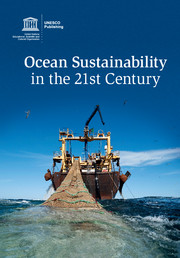Book contents
- Frontmatter
- Contents
- List of contributors
- Acronyms and abbreviations
- Foreword by Irina Bokova, Director-General of UNESCO
- Foreword by Thomas E. Lovejoy
- Preface
- Acknowledgements
- 1 Issues regarding oceans and opportunities: an introduction to the book
- 2 Main human uses of ocean areas and resources, impacts, and multiple scales of governance
- 3 Physical and chemical changes in the ocean over basin-wide zones and decadal or longer time-scales: perspectives on current and future conditions
- 4 Knowledge and implications of global change in the oceans for biology, ecology, and ecosystem services
- 5 A new perspective on changing Arctic marine ecosystems: panarchy adaptive cycles in pan-Arctic spatial and temporal scales
- 6 Ecosystem approach and ocean management
- 7 Challenges in using valuation in ecosystem-based management in a marine context: the case of UK Marine Protected Area designation
- 8 The contribution of international scientific cooperation and related institutions to effective governance for the oceans: the cases of regional tsunami early warning systems and the Argo project
- 9 Emerging and unresolved issues: the example of marine genetic resources of areas beyond national jurisdiction
- 10 The assumption that the United Nations Convention on the Law of the Sea is the legal framework for all activities taking place in the sea
- 11 The legal regime of outer space in light of the Law of the Sea
- 12 Towards sustainable oceans in the 21st century
- Index
- References
10 - The assumption that the United Nations Convention on the Law of the Sea is the legal framework for all activities taking place in the sea
Published online by Cambridge University Press: 05 May 2015
- Frontmatter
- Contents
- List of contributors
- Acronyms and abbreviations
- Foreword by Irina Bokova, Director-General of UNESCO
- Foreword by Thomas E. Lovejoy
- Preface
- Acknowledgements
- 1 Issues regarding oceans and opportunities: an introduction to the book
- 2 Main human uses of ocean areas and resources, impacts, and multiple scales of governance
- 3 Physical and chemical changes in the ocean over basin-wide zones and decadal or longer time-scales: perspectives on current and future conditions
- 4 Knowledge and implications of global change in the oceans for biology, ecology, and ecosystem services
- 5 A new perspective on changing Arctic marine ecosystems: panarchy adaptive cycles in pan-Arctic spatial and temporal scales
- 6 Ecosystem approach and ocean management
- 7 Challenges in using valuation in ecosystem-based management in a marine context: the case of UK Marine Protected Area designation
- 8 The contribution of international scientific cooperation and related institutions to effective governance for the oceans: the cases of regional tsunami early warning systems and the Argo project
- 9 Emerging and unresolved issues: the example of marine genetic resources of areas beyond national jurisdiction
- 10 The assumption that the United Nations Convention on the Law of the Sea is the legal framework for all activities taking place in the sea
- 11 The legal regime of outer space in light of the Law of the Sea
- 12 Towards sustainable oceans in the 21st century
- Index
- References
Summary
10.1 A commonly repeated statement
The resolutions that the United Nations General Assembly has adopted in past years on the subject ‘Oceans and the Law of the Sea’ emphasize ‘the universal and unified character’ of the United Nations Convention on the Law of the Sea (Montego Bay, 1982) (UNCLOS) and the need to maintain its integrity. The resolutions also reaffirm ‘that the Convention sets out the legal framework within which all activities in the oceans and seas must be carried out’ (Res. 68/70, 2013). Such a statement is often repeated by states and experts in international law of the sea. But does it fully correspond with the truth?
There is no doubt that the UNCLOS is a cornerstone in the process for the codification of international law. It has been rightly described as a ‘Constitution for Oceans’, ‘a monumental achievement in the international community’, ‘the first comprehensive treaty dealing with practically every aspect of the uses and resources of the seas and the oceans’, as well as an instrument which ‘has successfully accommodated the competing interests of all nations’ (Koh, 1983). The UNCLOS has many merits, which nobody could deny. However, the assumption that everything that occurs in the seas must necessarily fall under the scope of the UNCLOS, if this is what the words of the above mentioned resolutions are intended to mean, is far from being satisfactory, as this chapter will try to show.
In fact, the UNCLOS, as any legal instrument, is linked to the time when it was negotiated and adopted (from 1973 to 1982 in this case) and to what was possible to achieve during the negotiations for the drafting of its text.
A first remark regarding this is that there are some evident gaps in the UNCLOS itself, because the states involved in the negotiations were not willing or able to address and solve a few thorny questions that were deliberately left vague. Here, the gaps can be filled by resorting to provisions of customary international law (regulation through customary international law). It may also happen that some UNCLOS provisions are worded in too general terms, which lack sufficient precision.
- Type
- Chapter
- Information
- Ocean Sustainability in the 21st Century , pp. 232 - 248Publisher: Cambridge University PressPrint publication year: 2015
References
- 1
- Cited by



